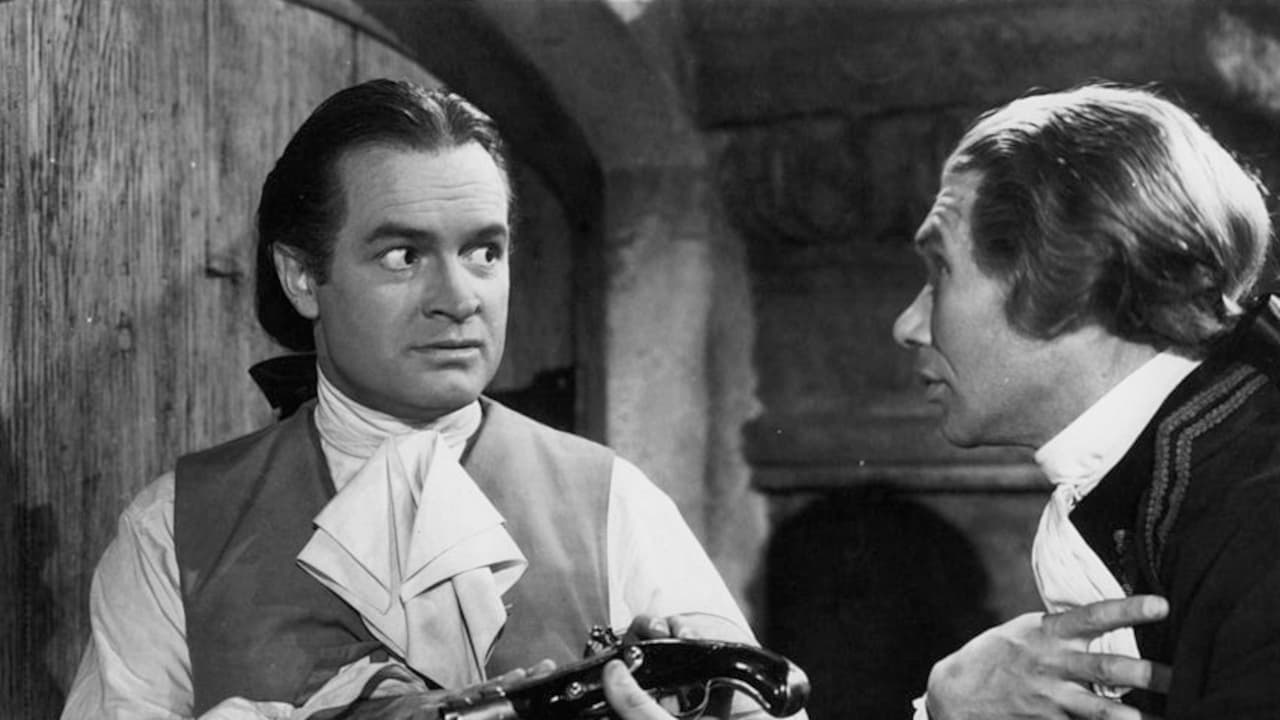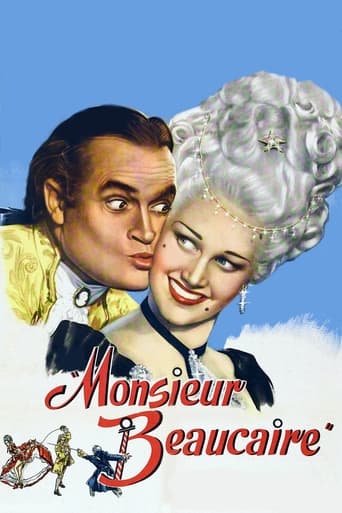

It's fun, it's light, [but] it has a hard time when its tries to get heavy.
... View MoreThis movie feels like it was made purely to piss off people who want good shows
... View MoreThe best films of this genre always show a path and provide a takeaway for being a better person.
... View MoreStory: It's very simple but honestly that is fine.
... View MoreIn this one, Bob Hope is Beaucaire, the French barber to the king. Beaucaire is in love with the maid Mimi, played by Joan Caulfield. Mimi has bigger ambitions, and gives him the brush off. Part of the joke here is that Hope disparages the king, the queen, and the royalty in general quite openly, when in real life, he would quickly be punished for it. Fun scene near the beginning where Beaucaire helps to hide Madam Pompadour, while pretending to give the Duke a shave. I was never a fan of period pieces, and if this weren't a Hope project, I probably would have turned it off. Mimi is sent off to Spain, and the real Duke, and Beaucaire dressed as the Duke end up there a well. Some fun recognizable faces in here... Cecil Kellaway, Reginald Owen, and Constance Collier for supporting cast. The musical numbers were completely un-necessary, and should have been eliminated. It's a grand adventure, with more meat on the bones that most of Hope's quick little comedies. The sword fight at the end goes on way too long. This one is okay. Not Hope's best. Directed by George Marshall. They had worked together on numerous films.
... View MoreFoppish skewering of the Booth Tarkington novel, previously filmed with Rudolph Valentino in 1924, casts Bob Hope (in dryly engaging form) as a barber in the French Court of King Louis XV who inadvertently gets his chambermaid-sweetheart banished to Spain; he follows her there while impersonating the Duc de Chandre, a notorious ladies' man who is to be married in an act of patriotism to the Princess of Spain. Seems lengthy at 93 minutes, with a few peaks and valleys in the plotting, and yet it's relaxed and pleasant enough to be palatable to even non-Hope buffs. Still, ace screenwriters Melvin Frank and Norman Panama don't know when to quit, and even the funny tag at the end is ultimately spoiled by unnecessary silliness. A couple of nice songs by Ray Evans and Jay Livingston, a good production, and a funny duel (with Hope's ski-slope nose getting caught in the harp strings) make for a fitfully amusing time. ** from ****
... View MoreBob Hope traipses up the palace gallery to be presented to the king—he is posing as a duke. Using a lorgnette, he can't see where he's going, and he gradually veers off to one side and stumbles into a lady kneeling on the floor and tumbles over her, knocking down about three other people .It's a ridiculously funny sequence.Hope is Beaucaire, a court barber in costume-era France. He gets mixed up in court politics and intrigue; poses as the Duc le Chandre, renowned lover and duelist; and chases after his girlfriend Mimi—who may or may not reciprocate his romantic feelings but certainly has adventures of her own. The entire cast is lively and beautiful in this very funny picture. Joan Caulfield as Mimi is bright, charming and silly; Marjorie Reynolds as a Spanish princess is lovely. Patric Knowles is dashing enough as the notorious duke—he is the perfect choice (King Louis thinks) to be shipped off to marry said Spanish princess, not only for political reasons but because all the "young bloods" in Paris will be happy to be rid of him. Cecil Kellaway is the harried count whose difficult duty it is to transport the reluctant duke to the arranged wedding site. Reginald Owen is hilariously un-regal as King Louis, and owns every scene he is in. Other highlights include a goofy palace swordfight between Hope and villain Joseph Schildkraut that involves a harp, a bass fiddle, and a harpsichord. Funny and fast-paced .A couple of decent songs and the usual assortment of Hope one-liners add up to a very enjoyable picture.
... View MoreSome current film fans with a perfunctory knowledge of cinema stars of the past will be shocked to learn that Rudolph Valentino and Bob Hope played the same title role in two different versions of Booth Tarkington's Monsieur Beaucaire. Of course you can believe there's a vast difference in the version.The Valentino version is a straight dramatic part about a Parisian barber in the court of Louis XV pretending to be a nobleman. Rudy was at his most romantic in the role and it was one of his biggest hits in the Twenties.Bob Hope's Monsieur Beaucaire finds Bob as a barber at Versailles in the court of Louis XV and worried about the romantic intentions of his sweetheart, scullery maid Joan Caulfield. Cole Porter wrote it best that Caulfield is true to Hope in her fashion, but she's an ambitious girl who knows what it takes to get ahead in the court. She aspires to be Madame Pompadour who is played here by Hillary Brooke.Due to a set of circumstances way too complex to write about, Hope and Caulfield both get themselves banished, mainly because of Hope's fantasies and both get themselves involved in the politics between France and Spain where a royal marriage is being arranged to the dismay of both participants, Marjorie Reynolds for the Spanish and Patric Knowles for the French.Playing the puppet-master in all the intrigue is Joseph Schildkraut who shows a real flair for comedy. His final duel with Hope ranks right up there with one Hope engaged in with Basil Rathbone in Cassanova's Big Night. Rounding out a wonderful cast of supporting players are Howard Freeman as the King of Spain and Reginald Owen and Constance Collier as the King and Queen of France. You don't doubt why Louis has Madame Pompadour around when you take one look at the Queen. By the way Joseph Schildkraut comes to one of the most satisfying ends a villain ever got in film. You'll have to see Monsieur Beaucaire and laugh all the way through to see what happens.
... View More